How to Use Bots to Create Personalized Experiences
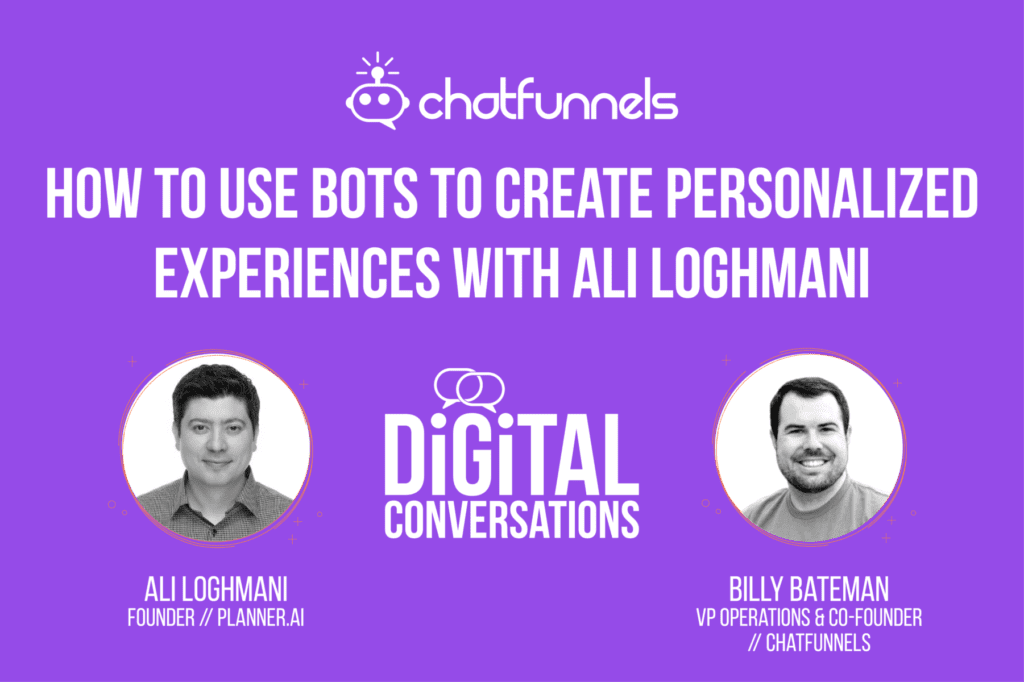
Reading Time: 9 minutes
Overview: In this episode of Digital Conversations with Billy Bateman, we are joined by Ali Loghmani founder of planner.ai. He focuses on using bots to scale a business in the education space. He goes through how to create engaging personalized content and provide useful add-ons.
Guest: Ali Loghmani– Ali co-founded his 1st startup in 2002, and made an exit the same year. He started coding from an early age with a Sinclair Spectrum 48k when Ali was 13, and sold he first product, an inventory management system, fully developed in C when he was only 16. Since then he have been building and selling software.
Listening Platforms:
data:image/gif;base64,R0lGODlhAQABAAAAACH5BAEKAAEALAAAAAABAAEAAAICTAEAOw==
Transcription
Billy: Welcome to the show today. Today I have the pleasure of being joined by ali Loghmani and you can correct me if I’ve said your name wrong, Ali. Thanks for joining us.
Ali: Thanks for having me, it’s a pleasure. You did a great job on the pronunciation.
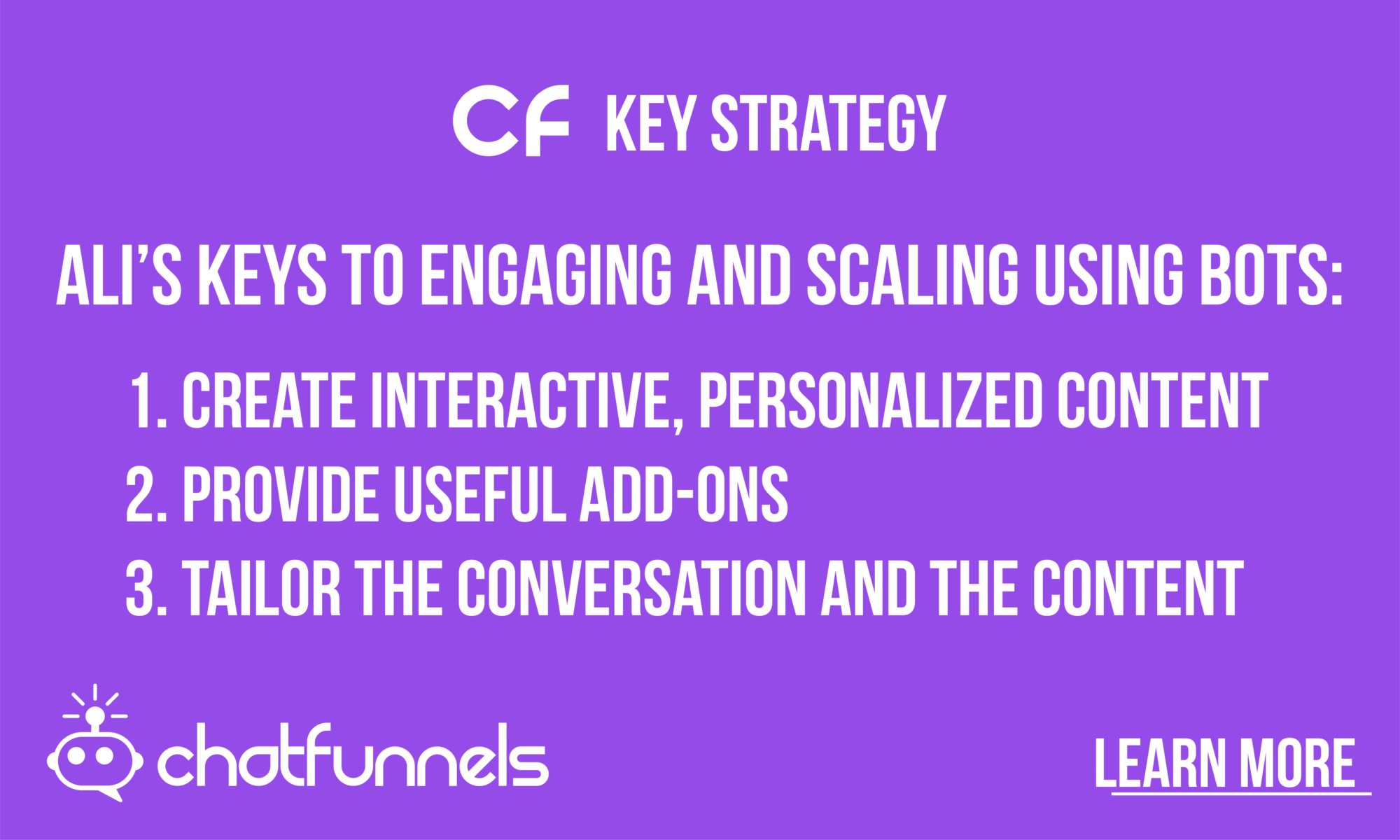
Billy: Awesome man. Thank you. So today we’re going to talk a lot about what you’re doing with planner.AI but before we get into that let me ask if we were going to look you up on social and try to figure out who Ali is by looking at your Facebook, your Instagram, your LinkedIn that we wouldn’t know about about Ali.
Ali: Wow that’s a very tough question. So being an introvert and trying to become an extrovert there’s a lot in my past that is not out there and thank God. I started coding at a very young age and I immigrated to the US in 2007. So there is a big period which I did not miss, Facebook was not there prior to 2006. I used to use orcod.com. It’s a dead social network. It’s not working right now and a lot of my content was there but long story short I am a technology enthusiast. I love chatbots. I quit my job five years ago to work on chatbots and I’m devoted to spreading the word about this technology and committed to making sure that this becomes a. You know what I call myself, I’m just losing some words here.
Sorry I had a meeting prior to this but I like to call myself a chatbot evangelist. I’ve been doing podcasts shows for about two to three years now. I don’t want to be callous or insensitive to what’s happening during this pandemic but this COVID-19 has opened big gaps in many processes that we do on a daily basis and education is one of them. Somehow what I started doing two years ago which was creating autonomous chatbots or autonomous tutors sort of mix resonance with what’s happening right now in the education vertical.
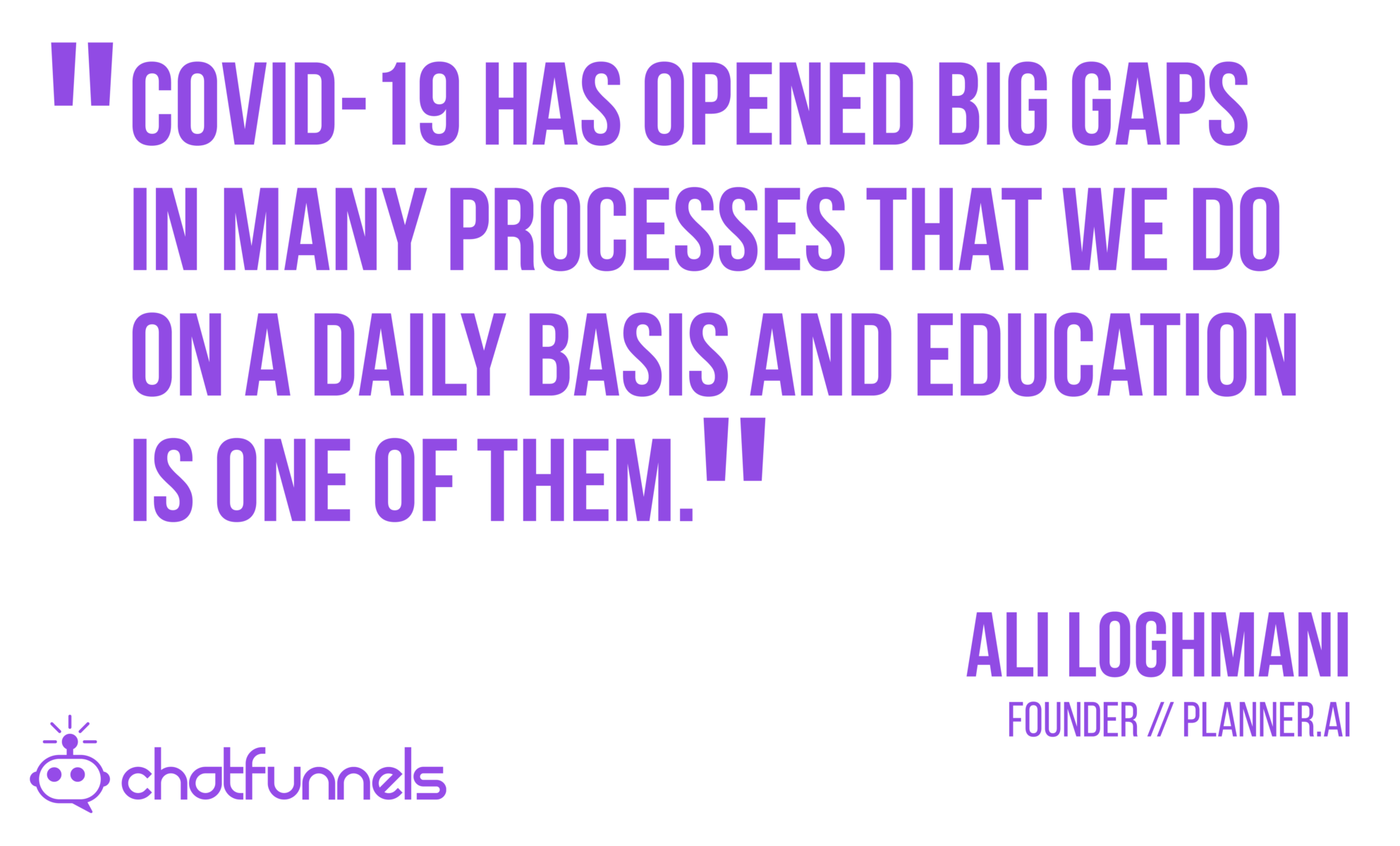
You see a lot of parents struggling educating their kids, getting along with remote learning. You see teachers being confused and not knowing exactly how to catch up with 30 students remotely. Not to mention that prior to all this people were sort of not feeling happy with the promise of Moocs. We all know that by now it’s evident that Moocs have not delivered on their original promise. Which was turning the educational industry on its head. When it comes to people finishing courses on Moocs that are rated at that rate is notorious.
Billy: So would let me pause you for a minute. For those people that aren’t familiar with what Moocs are can you just expand on that for a minute?
Ali: Sure yeah. Moocs is an acronym for Many Online Open-source Courses if i’m not mistaken.
Billy: Like a master class.
Ali: Exactly. Yes like a masterclass, Youdame, pluralsight.
Billy: Awesome I’m just going to walk it back a minute. You said you quit your job to get into chatbots. So what were you doing with your job? Where were you working and what inspired you to get so passionate about bots?
Ali: Sure so I quit my job five years ago. Prior to that I was working as a consultant for a solution integrator working on open source technologies like open source. No sequel open source search, open source content management systems here in the Bay Area. I’ve been doing that for a long time. After I sort of failed my first startup here in the US in 2010 which was sort of in the neighborhood of chatbots. Which was a precursor to full fledged conversational search if you will or conversational UI. Orakei chatbots or as I prefer to call it autonomous subject matter experts.
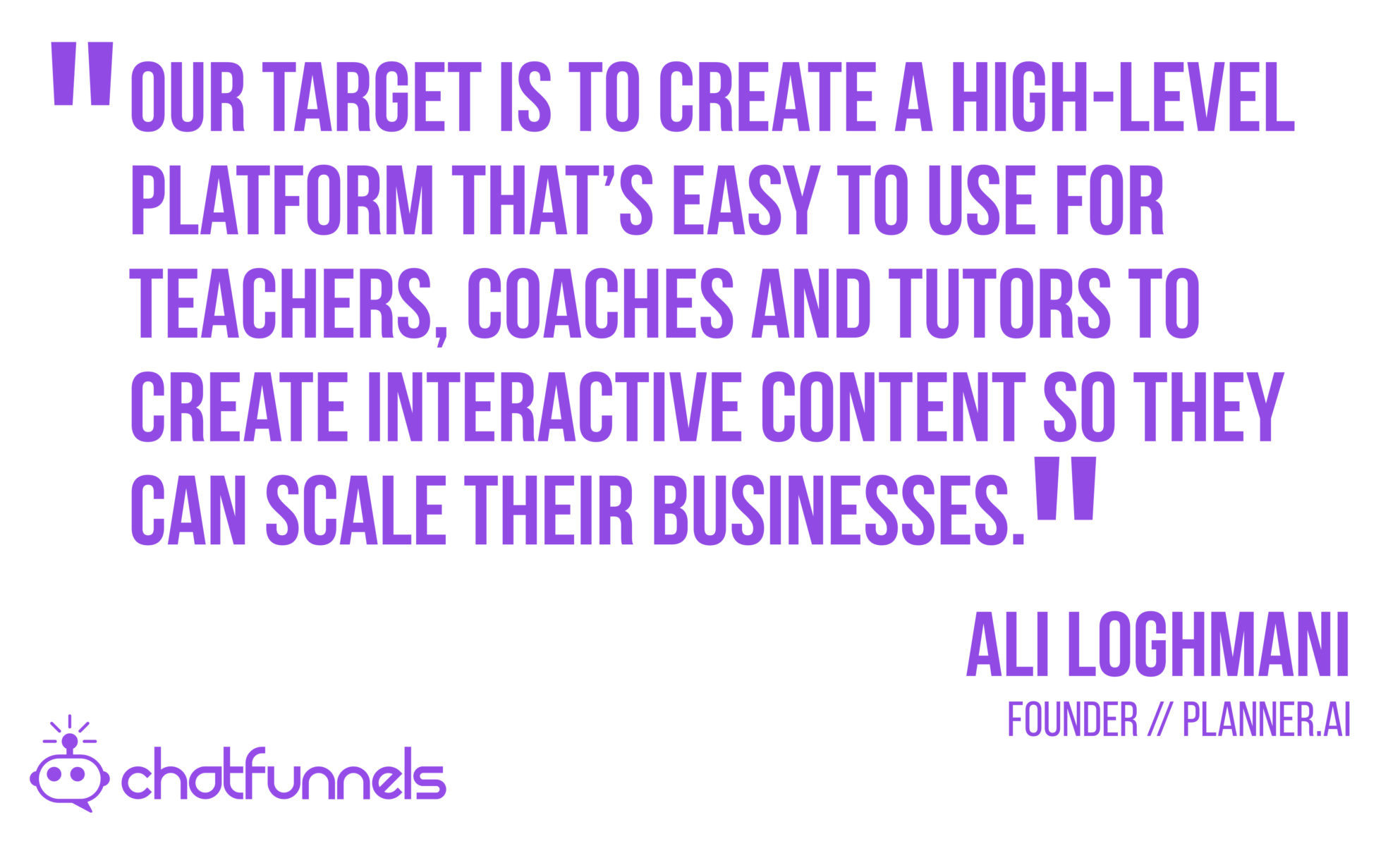
What inspired me, well it all started with a bottle of whiskey in December 2008 with my cousins and Miami. We had a conversation about how difficult it is to use Google to search for something in a particular context and ask follow-up questions. That inspiration sort of pushed me to try a pet project for which I spent I don’t know close to 20K of my personal money and hiring people in France and China through these remote talent sites at the time. That taught me a lot that’s helped me a lot. It was prior to all this deep learning, a tsunami if you like. It was around 2008 to 2012.
Billy: And then that led you into planner.AI which you’ve told me about. I think it’s a very interesting product. What’s the goal with planner.AI and how are people using it?
Ali: Alright so we are still testing the product. It is a platform for private tutors and private coaches. Things that I can give away right now since we are still in early days of testing. Our target is to create a high level platform that’s easy to use for teachers, coaches and tutors to create interactive content so they can scale their businesses to many more students and many more consumers.
Now with a zoom becoming mainstream becoming a house name these days. It’s not that hard to imagine working with your tutors and your professor in a one on one setting. Now the problem is that professors are very expensive or they don’t have enough time to do this one on one for every student. But this tool would allow them to scale their services to many more students concurrently. In a way we want to create digital avatars of each subject matter expert through this platform. Help them empower the professors, empower the service providers to scale their services to many more students. That’s the idea.
Billy: Okay so let’s say I’m a language tutor and I teach people German. Let’s pick a language that not many people go out of their way to learn. But I’m a German tutor and I probably have 8 to 10 hours a day that I could have sessions and charge like 100 dollars to 500 dollars whatever I’m charging. My income is limited to how many hours I can work if it’s a one on one setting there. What you’ve built is something where I can create a chatbot to scale that tutor.
Ali: Correc222
Billy: Do I need to know how to code? Can I just build it as someone that’s not technical? What’s required there?
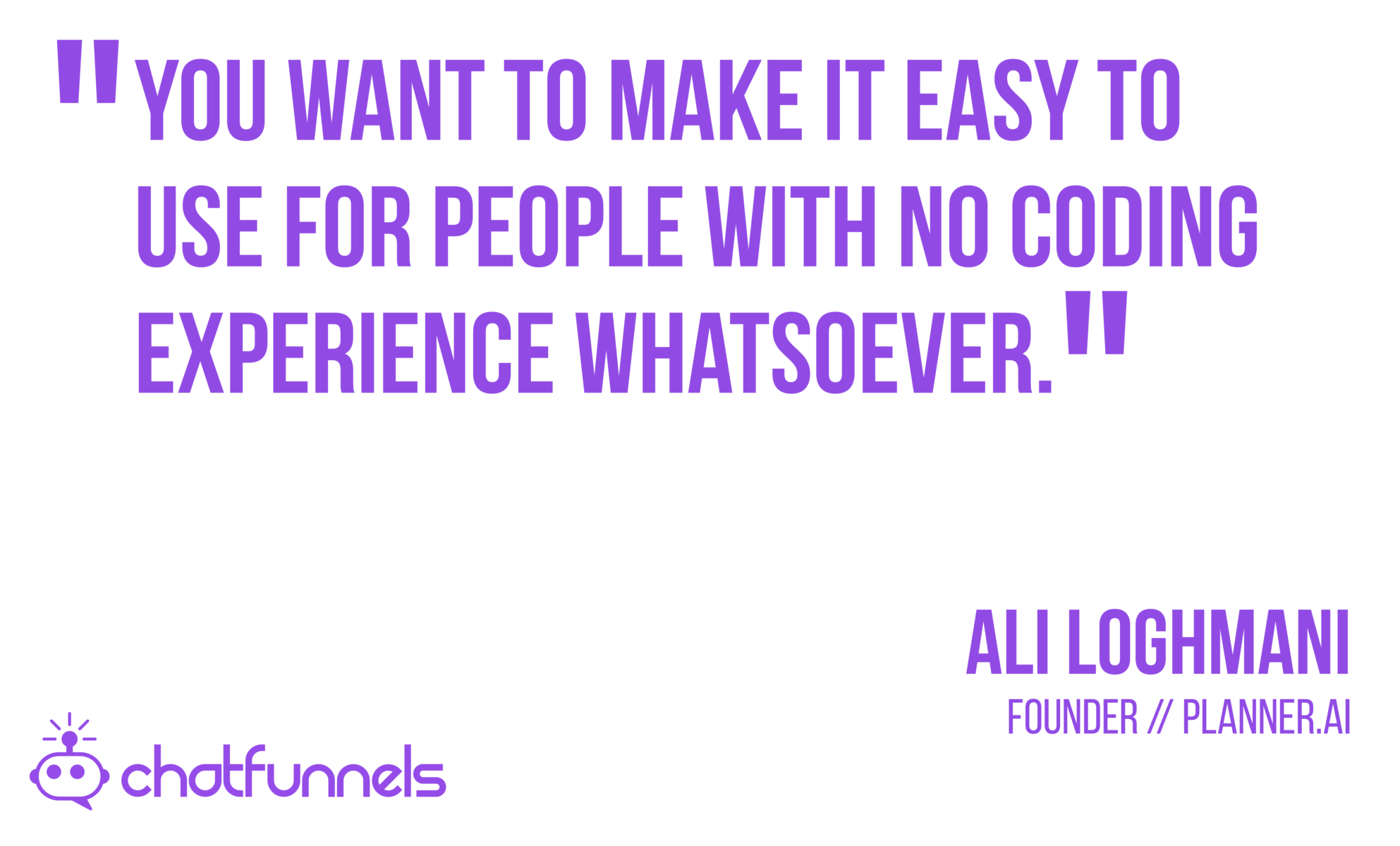
Ali: Alright so for those of us who are familiar with the dialogue flow or with.AI or some other tools out there, still you need to know some coding to make valid flow works or cognizant work or razo work but other than that this platform that I’m talking about you want to make it come easy to use for people with no coding experience whatsoever. So no coding at all and even no training at all. I mean that’s a tall order to begin with but the idea is to make it like the early days of photoshop like magic you just create the interactive content and everything would start functioning automatically.
All you need to do is conduct your classes online and then as you do more classes the system will learn and then we would use your content to scale your services to more people so you can earn more money.
Billy: Awesome man. So you’re still in the beta phase is what it sounds like.
Ali: It’s private alpha we’re still iterating and bot fixing features and adding features and getting rid of useless features and adding needed ones. And I also have to share this with you that this is a content game.
Then you cannot expect Google or Facebook Facebook for the world to come in and say. Hey we have a tool that would work for every vertical. So you picked up the German topic. Well arguably any tutoring topic would require its own add-ons and for a platform to function seamlessly. And pleasantly you have to provide useful add-ons. You cannot take this system and say let’s use this system and start teaching chemistry how about atoms to molecules and atoms and whatnot.
So we all are also iterating on topics as well to see which topic would break. I can share this with the very first moment that you show that this platform works well for one vertical. The next question that will come to mind is alright you can create autonomous German tutors or autonomous French tutors or English tutors. Can you do autonomous chemistry tutors? The answer would be yes but we need to start acquiring content with that.
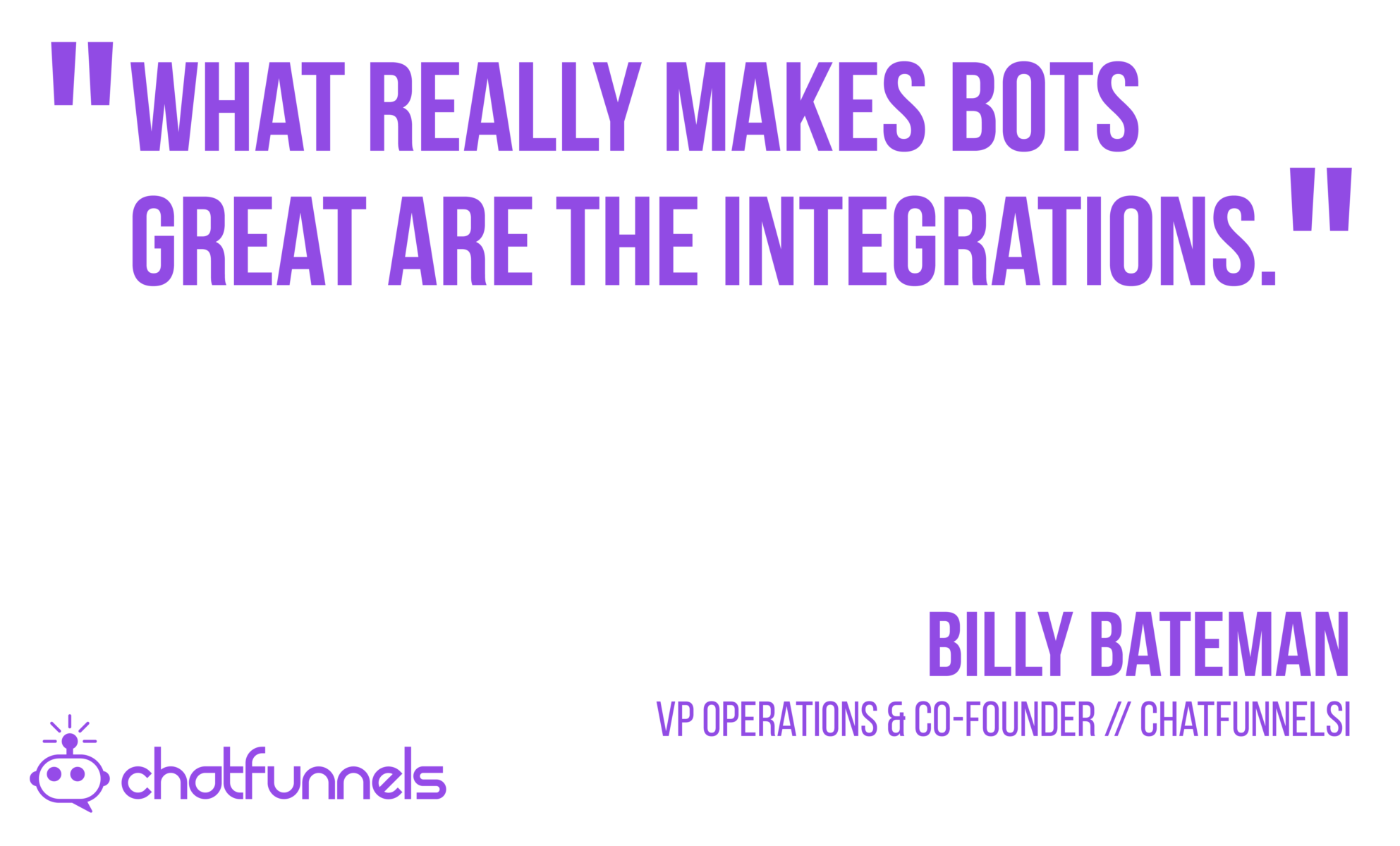
Billy: Well it goes back to you know having a conversation yesterday and we were talking about what makes a useful bot and about that just existing in itself without pulling information from other places is not that useful. What really makes bots great are the integrations.
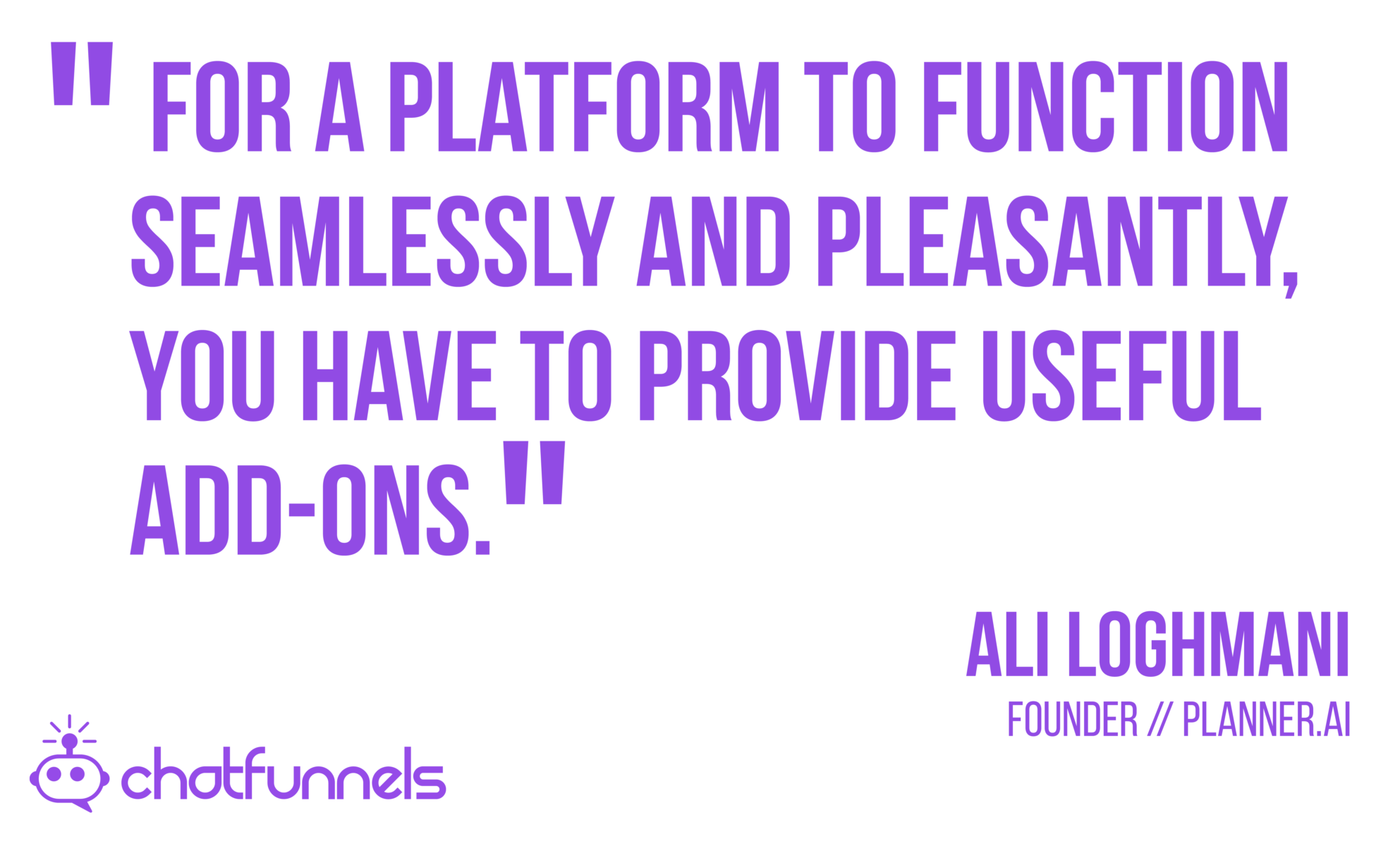
Well I’m able to pull information out of if it’s a business out of the CRM out of your marketing automation platform. Integrate with your calendar in solution or with you I’ve got these verticals and these resources where I can pull that information.
Ali: You nailed it on the head. You have to have great integrations with your ERP, CRM, with your content management system, with the Federation of different styles of sharing your system. I like to challenge you and say that although this has been the belief for many years now since the birth of the new wave of chatbots which is not very long. But what I’ve learned from my mistakes is that chatbots cannot fetch content from any source and present it to end users as is.
You can fetch content and show it to a subject matter expert or an agent in the loop and say hey this is what I found for you. How do you want to translate it? And how do you want to paraphrase? How do you want to change it? The way I see it is that for a conversation to function as a conversation you have to tailor the seeds or the ideas of each decision that they make at each step of the way while running decisions from the AI terminology. A decision is being watched by a show to your user as a response. In addition you have to tailor that you cannot show it as.
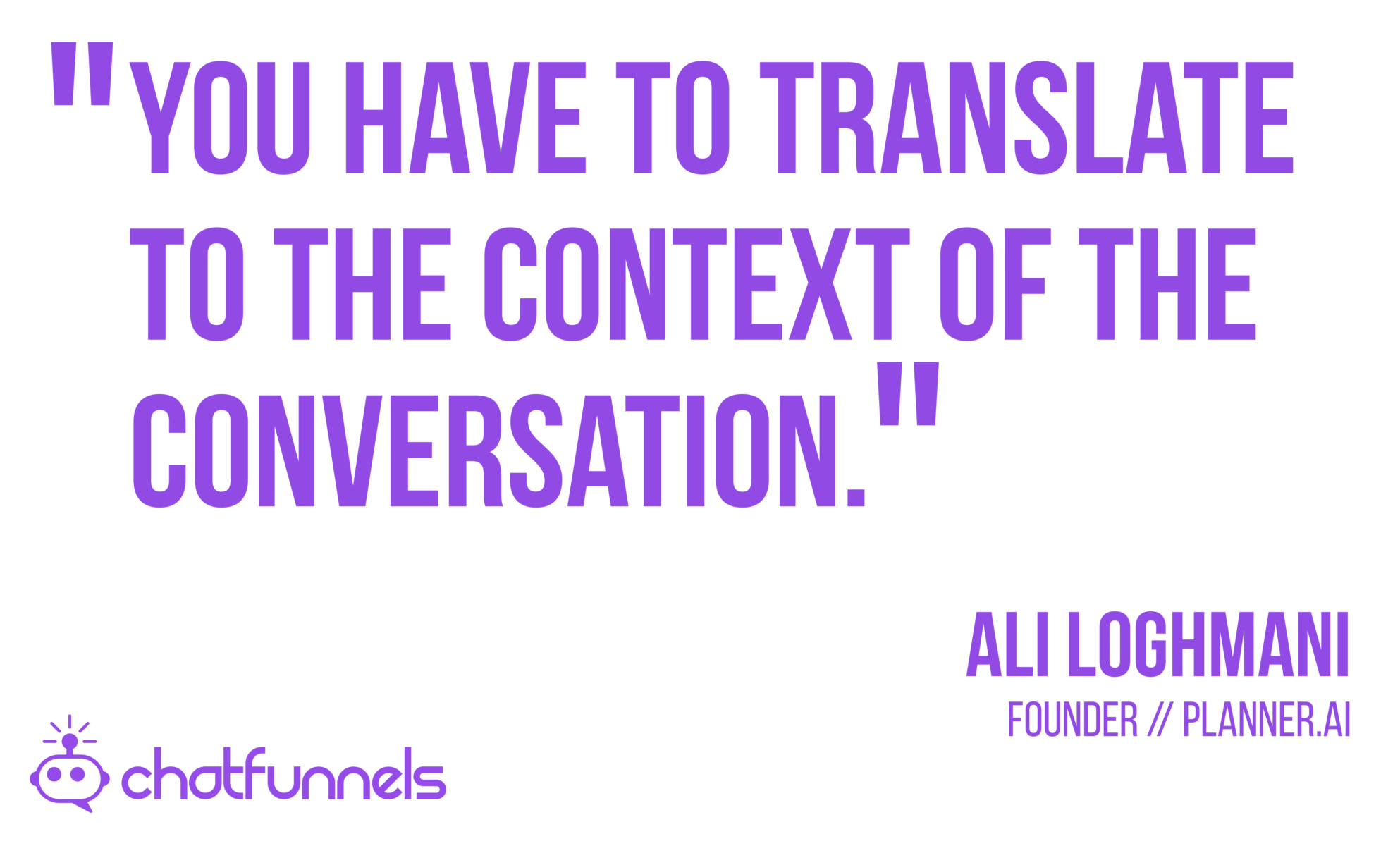
You cannot show that seed or that raw sentence to your consumer. You have to translate to the context of the conversation. And in doing so if you wanted to do that are you suggesting that I cannot switch anything from ERP or CRM? I’d say yes you can but you cannot show it.
What if you had a system that doesn’t help you create autonomic contacts and then it would say: this sentence, this paragraph, this video, this audio, this Lego piece is perfect for this context. You search for his perfect content. I have an answer for it. I have a brick for it going to fit right there.
Billy: That would be great.
Ali: Well I don’t want to bore you with a stale idea of blogs and blogging and vlogging but for 30 seconds. When you write a blog as a blogger you have to blog 100 times a year right? And when you blog you have to consider writing for 10,000 people otherwise you won’t get enough hits. When you write your post it’s not good when you do that when you start writing for 10,000 people you are compromising kind of specificity and can compromise on that in order to gain more hits.
Then that blog post won’t resonate with me as an individual. Chatbots are here to change that. Chatbots show me personalized content and how do you do that? You have to create smaller pieces of data highly contextual and the idea behind our products to help tutors and coaches create contextual content be it interactive contents.
Billy: Awesome man you’re right. The great thing about a chatbot is if it’s done well you can give that personalized content and context to people. It’s always a challenge to get there and we’re working on it up but I’m glad you guys are tackling this problem. If people want to get a hold of you and continue the conversation what’s the best way for them to reach out?
Ali: You can find me on Facebook, you can find me on LinkedIn, on Twitter, on Instagram as well. I’m not big about tick tock as a social medium there. We can also email me at Ali at planner dot AI. Do you need a phone number as well?
Billy: I think we got it. So you know how to find Ali and thank you again for coming on. We’ll chat later.
Ali: Thank you.
